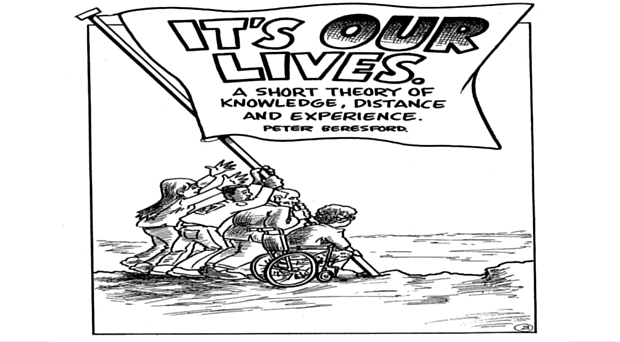
Citizen involvement, including specific service user involvement, in research is perhaps the most important research innovation in the twenty first century.
Yet, there seems to be an irony at the heart of such participatory research. In its most developed expressions, participation does not seem to be its sole or main concern.
The emancipatory disability research developed by the disabled people’s movement offers us the first important insight here. Growing out of disabled people’s distrust of mainstream research, it took their participation as a necessary but not sufficient condition of research. What was crucial was that research should be concerned with their liberation.
Thus the degree of concern amongst service users and researchers is that in many cases conventional user involvement in research is more a matter of ‘box-ticking’ and is tokenistic.
Since then, the emphasis of user-controlled or user-led research, developed by wider movements of welfare service users, has been that they should be in control of research. While by some accounts they do not have to undertake all aspects of research, it should always come under their control.
Survivor research, that is research initiated and carried out by mental health service users/survivors has also placed an emphasis on the ethics of research, developing detailed guidelines for how such research should be carried out in a responsible and humanistic way.
What is also interesting is that less developed forms of patient and user involvement in research, particularly those emerging from the service system rather than service users themselves, seem to have placed a greater emphasis in principle on participation, but have often fallen short in service users’ eyes in practice.
Thus the degree of concern amongst service users and researchers is that in many cases conventional user involvement in research is more a matter of ‘box-ticking’ and is tokenistic.
I have had the opportunity to be involved in many different kinds of participatory research, including user involvement…
The point remains however, that while there are still big barriers in the way of user involvement in research – both because of the methodological challenges it poses and its continuing inferior access to funding – massive progress has also been made.
As someone who has worked to advance such involvement, in research and in policy and practice over my research career, this therefore still represents a ground-breaking achievement.
I have been in the privileged position of being both an academic researcher, and as a long term mental health service user, a service user researcher. I have had the opportunity to be involved in many different kinds of participatory research, including user involvement, both collaborative and user controlled.
I have seen more and more researchers become supporters and advocates of such involvement.I have seen a growing cannon of such research work, as well as the development of theory and methodology in this area.
I would like to see more large user controlled quantitative and mixed methods projects – to demonstrate that such involvement research is and needs to be seen as part of the mainstream. I think it is important that we develop our own ways of sharing both our work and our learning.
Research Involvement and Engagement represents an important milestone in this goal.
… I would like to see a wider range of service users… enabled to undertake their own research.
Meanwhile I want to see more service users who would like to, to have the opportunity to get research training, to undertake PhDs and post-docs and to have research careers.
I would like to see more mainstream researchers given the support they need to work in more participatory ways, which so often they want to – especially younger/newer researchers.
And I would like to see a wider range of service users, for example, people from the neuro-diverse community, older people and people with learning difficulties, enabled to undertake their own research.
Twenty years ago this would have looked a tall order. Now it seems like a realistic agenda for action.
Join our tweet chat
With this increased call for action, and as part of our Open Access Week celebrations, BioMed Central will be holding the tweet chat on Friday 23 October, 12:00-13:00 (GMT+1):
Academic publishing and patient/public awareness of research – two sides of the same coin? #PPIpublishing
We want to know how patients and the public envisage collaborations with publishers and what they would like to see from publishers as patient and public engagement and involvement in research evolves.
The tweet chat will be steered by @MedicalEvidence and supported by Editorial Board Members of our patient and wider public involvement and engagement journal, Research Involvement and Engagement.
The questions we will be discussing during the tweet chat are:
- As patients and members of the public, how do you find/access the findings from academic research?
- What should publishers do to make their journals and articles more accessible to patients?
- How can publishers engage patients and the wider public beyond journals?
To spread awareness or to join in on Friday 23 October, 12:00-13:00 (GMT+1), use the hashtag #PPIpublishing.
Also, if you can’t join, please tweet your questions to us throughout the week using the hashtag #PPIpublishing.
One Comment